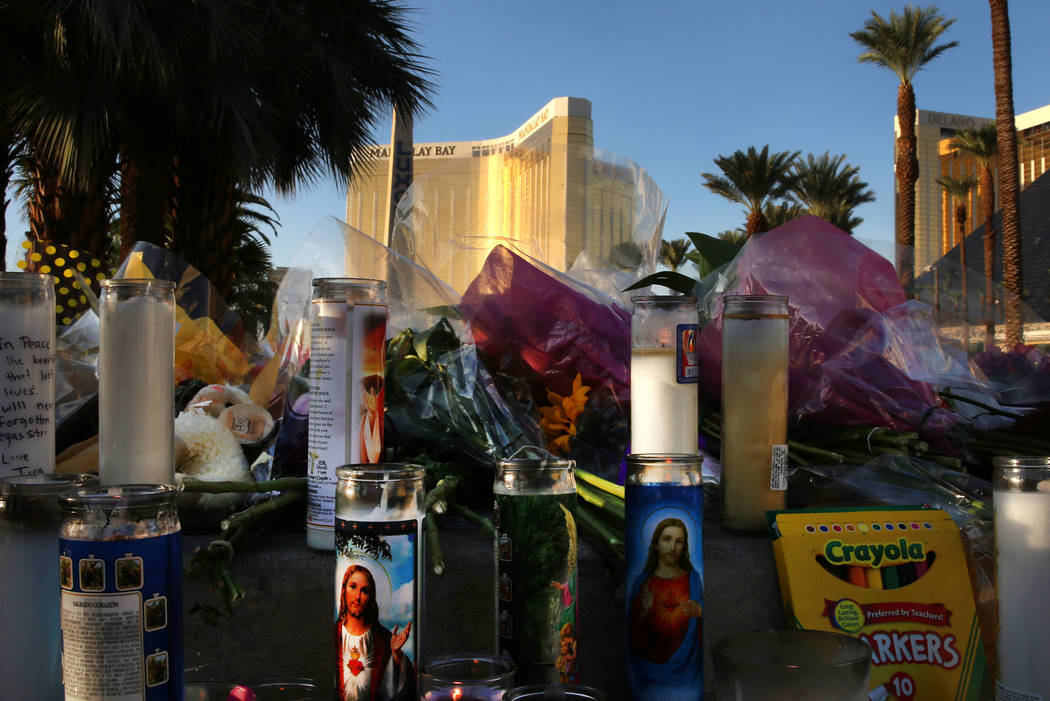Psychological trauma normal in weeks after mass shooting, experts say
It’s been more than two weeks since a shooter killed 58 people and wounded 546 others at a country music concert outside Mandalay Bay.
But concertgoers or members of the Las Vegas community who are still processing the event and feeling shaken shouldn’t worry: Experts say that’s normal.
“What happens in our brain is an automatic stress response. Whether you were hurt or not, the brain still (expends) energy,” said Shelby Buckles, a Las Vegas counselor who has consoled shooting survivors.
Symptoms can vary, but can include avoidance of triggering sounds or images or hypervigilance, Buckles said.
People might also separate themselves from loved ones or lose interest in normal activities, said Michelle Paul, director of UNLV’s mental health clinic, The PRACTICE.
You don’t have to have attended the concert or seen the shooting to be affected. Anyone can have a reaction, Paul said.
People who tend to be more emotional might have a stronger reaction, Buckles said.
Buckles, a Las Vegas native, has experienced hypervigilance herself. She went to see Janet Jackson perform at Mandalay Bay on Sunday and said she immediately searched the venue for exits and seized on the heightened security at the entrance.
“I was sitting there and I just started thinking about how it would probably be hard for someone who was at the Route 91 Harvest festival,” Buckles said.
At the one-month mark, people who are still suffering symptoms should consider seeking help for post-traumatic stress disorder. Common manifestations include flashbacks and nightmares, feeling guilty or numb, chills, tension headaches and shaking, the Centers for Disease Control and Prevention states.
“Most people report feeling better within three months after a traumatic event,” according to the CDC. People with PTSD might also have panic attacks, feel depressed or turn to drugs for relief.
Therapy can help ease the symptoms, either finding a support system or working with a clinician to process feelings, said Paul. Sometimes, medication like anti-depressants and anti-anxiety pills might be necessary — though they should be used as a last resort, she said.
Will the symptoms go away? Over time, they may, Paul said.
“There will be a scar, but scars can fade,” she said. Those who hadn’t experienced a traumatic event before the shooting are more likely to move on, though days like anniversaries can be triggering.
And for some, the trauma might ignite personal growth.
“I had a period of time in my life where it was painful, and very, very difficult,” Paul said. “Now, when stress comes my way, I’m much more confident in my ability to weather it.”
Contact Jessie Bekker at jbekker@reviewjournal.com or 702-380-4563. Follow @jessiebekks on Twitter.
Free Vegas-area counseling
— Bridge Counseling: Call 702-474-6450 for an appointment, or daily group counseling at 3 p.m. at 1640 Alta Drive, Suite 4.
— Red Rock Psychological Health: Call 702-898-5311 for more information.
— Las Vegas Counseling Center: Call 702-466-3750 for an appointment.
— ROI Counseling: Call 702-816-2595 for an appointment.
— Montevista Hospital: Call 702-354-1111 for an appointment.
— The PRACTICE at UNLV: Call 702-895-1532 for an appointment.
— Oasis Counseling: Call 702-294-0433 for one free appointment.
— UNLV School of Medicine: Call 702-253-0818
— Corridor of Hope Wellness and Consulting: Call 702-522-9000 or 702-370-2960 for an appointment.
— Lake Mead Wellness Center: Free Growing Through Grief group therapy Oct. 22 at 6 p.m. at 311 S. Water St. in Henderson.
— Community Counseling Center of Southern Nevada: Free walk-in support is available from 6:30 until 8 p.m. nightly. Call 702-369-8700 for more information.
The Trauma Intervention Program has tipsheets on its website, https://www.tipoflasvegas.org/vegas, on what to say to traumatized loved ones and how to help children cope with grief, among other resources.























